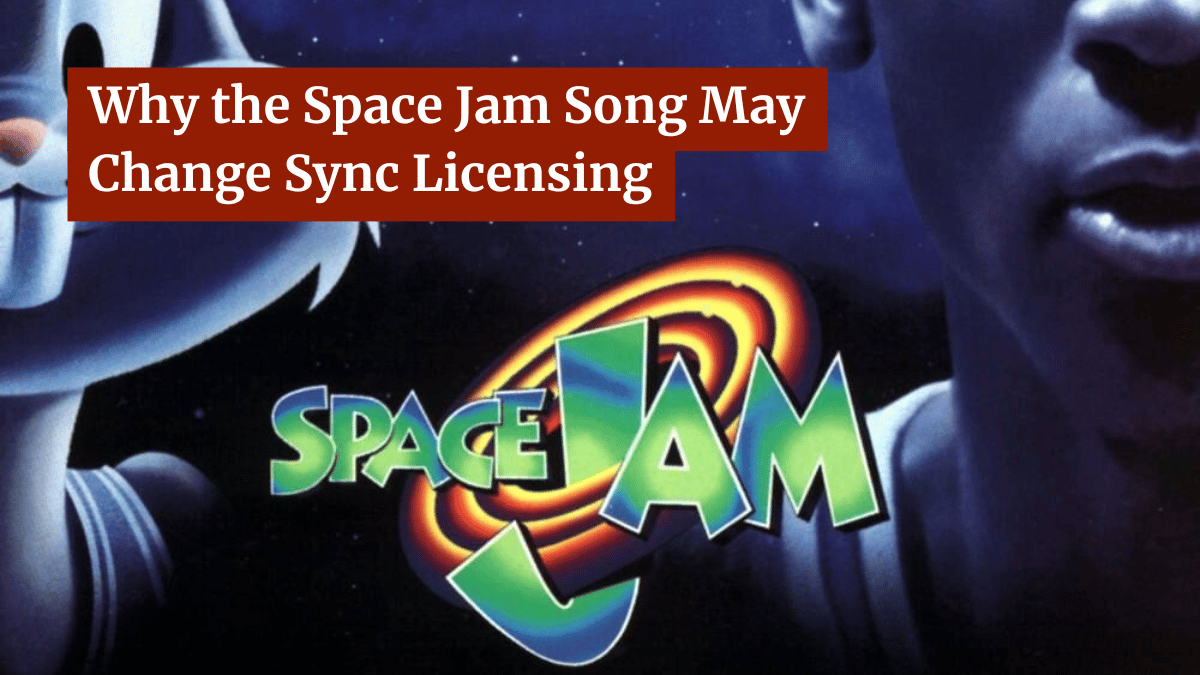Space Jam and the Future of Sync Licensing

Last week, music licensing company Watson Music Group filed a lawsuit against the Wisconsin Timber Rattlers, a minor league baseball team that is an affiliate of the Milwaukee Brewers.
At issue in the lawsuit is a 2017 Facebook video that featured the team’s mascot slam-dunking a basketball while the theme from Space Jam played in the background.
According to Watson, they acquired 100% of the rights to the song in 2019 and the 35-second video is an infringement of the work. They are seeking as much as $150,000 in damages.
The song, entitled Space Jam, was originally written and performed by members of the hip-hop trio Quad City DJ’s, it rose to fame in early 1997 along with the rest of the soundtrack for the film.
However, this isn’t the first lawsuit that Watson has filed. According to Bill Donahue at Billboard, in May the company targeted the sports betting company SportsGrid and, in June, they filed a lawsuit against a Florida company named CPPM Leasing LLC.
But the Watson website makes it clear that even these lawsuits are just the tip of the iceberg. With a banner that reads “Did you receive a notice from us?” the site is foremost an information resource for those that have received notices from the group.
Long-time readers of this site will almost certainly recognize this approach to copyright enforcement. Sometimes referred to as “speculative invoicing” or even “copyright trolling”, it’s a practice that many associate with photographers that is now coming to the music industry.
That is a change that webmasters and web users alike need to take note of.
A Long History of Legal Threats
To be clear, this particular strategy has never been exclusive to photographers. Authors, such as Keith F. Bell, who wrote the book Winning Isn’t Normal, and poet Linda Ellis, who wrote The Dash, are famous for their aggressive litigation tactics. Other types of creators have participated in it as well.
However, there isn’t much doubt that photographers and visual artists have very much been the epicenter of the practice. Long frustrated with widespread infringement and limited options for practical enforcement, photographers turned to this approach as an alternative to either just sending takedown notices or going through the expense of full lawsuits for every infringement.
For photographers, the approach was largely popularized in the early 2010s by Getty Images, who sent thousands of demand letters to website owners who had used Getty-licensed images without obtaining a license.
Since then, companies such as ImageRights, Pixsy and PicRights have opened up to make it easy for photographers to get started by offering tools to detect infringements as well as a process for sending settlement demands.
In short, sending legal demands is practically an industry within the photography industry.
What makes this story unique is that it’s over a song, not an image nor a poem.
Though the music industry has targeted individuals and small businesses before, most notably the RIAA file sharing lawsuits in the early 2000s and the regular litigation by ASCAP and BMI against bars, restaurants and other public venues that play music without obtaining a license, those cases all involved multiple songs.
Here, the issue is just one song, and it appears that Watson Music Group is only licensing and enforcing rights around this one track.
The situation is unique, but it should give website owners and users alike pause before they publish their next video or song.
The Challenge of Music Licensing
Music licensing, as we’ve discussed before, is incredibly complex. Every song has two separate copyrights, one on the composition and one on the recording, and there are different types of licenses for each that are necessary depending on the activity you want to do.
However, for most kinds of licenses, the music is very consolidated. For example, if you want a public performance license, you can reach agreements with the major performing rights organizations (PROs) ASCAP, BMI and SESAC to license nearly all popular songs. If you want a mechanical license to put a cover of a song on CD or streaming, that license is compulsory and the rate is set by the US Copyright Office.
However, synchronization licenses are somewhat unique. They are owed whenever a song is used in an audiovisual work, such as uploading it as part of a movie or a video game. Those licenses are usually handled directly by the copyright holder, usually either the songwriter or their publisher.
This can be incredibly difficult to do and, as others have noted, such covers and uses of songs are often tolerated simply because it’s not worth the effort to target them unless a significant amount of money is involved.
This has led some to call for the creation of a Sync Rights Organization (SRO) to bring this kind of collective bargaining to sync rights. However, right now, such an organization does not exist and, though some social media sites have signed deals with larger publishers, smaller ones are rarely part of that deal but almost never have any practical alternative.
That, in turn, is the path Watson is taking. They are a small publisher, at this time only licensing and enforcing one song (that we are aware of), but doing so using the controversial approach used by photographers for over a decade.
This could be something of a reckoning for users when it comes to sync licenses. For most creators, sync licenses just haven’t been an issue. Between large publishers signing deals with social media websites and smaller ones being either unwilling or unable to enforce their rights, it’s an issue that hasn’t gotten a lot of attention.
That makes what Watson is doing stand out all the more.
Bottom Line
To be clear, these tactics are divisive. Though I’m deeply sympathetic to the plight that photographers and other smaller creators face when there is widespread infringement of their work, I also acknowledge that this approach can feel disproportionate, especially when it comes to targeting individuals and very small businesses that simply did not know better.
There are no easy answers here and, though the Copyright Claims Board may be able to help with some of these cases, it’s far from a fix-all solution.
That said, sync licensing has been a particularly large blind spot for many creators. It simply hasn’t generated that many legal battles or made that many headlines, outside of the licenses with large publishers that social media sites have signed.
No matter how one feels about this particular approach, it shouldn’t shock anyone that smaller publishers are taking notes from photographers and using the same techniques to fight back. Though it’s unclear how effective these techniques are at reducing infringement, there’s not much doubt that they have been lucrative for many artists.
A good outcome for this would be a better conversation around sync licensing and reform in this space. As has been pointed out repeatedly, the system for sync licensing that worked 20 or 30 years ago doesn’t work well today, at least not for all creators.
Hopefully, we can start to think about ways to fix the system so that it works for all creators, not just those represented by major publishers.
Want to Reuse or Republish this Content?
If you want to feature this article in your site, classroom or elsewhere, just let us know! We usually grant permission within 24 hours.
